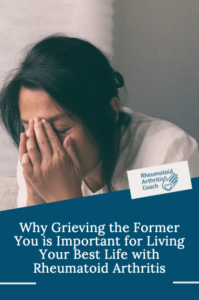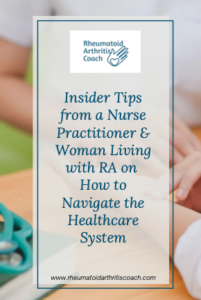I remember the day I received my RA diagnoses vividly. I bet you do, too.
I was formally diagnosed with rheumatoid arthritis (RA) at age 28. Just like many of you, my journey had a lot of ups and downs and took several years. At the time of my diagnosis, I had a husband, a 1 year old son, and a both physically and mentally demanding job.
The last thing I wanted to hear was that I had RA. If I’m guessing, you probably felt the same way.
On the day I was diagnosed, I left the rheumatologist’s office and cried in my car for 20 minutes.
I cried because I realized that the life that I knew would never again be the same.
I cried because I had begun to grieve my former self.
It wasn’t hard to find information about the physical impacts of the disease. They were listed everywhere: websites, magazines, books, pamphlets, and even on posters in my rheumatologist’s office.
But something was missing.
None of these resources mentioned the emotional impact a diagnosis of RA could have.
The information did not tell me how to cope with the loss of the life I had lived and loved for so many years.
RA seemed to take away the life I once knew overnight.
It affected my social plans, intimacy with my partner, my career path, my financial planning, and even starting and raising my family. I knew that in 1 short office visit, the course of my life was forever changed. All of the sudden, I realized that the life that I had planned for, expected, or anticipated was gone.
The grief of this loss was overwhelming for me at that time. Maybe it is for you, too.
That’s why I’m here to tell you that there is hope.
When you’re diagnosed with a chronic illness, like RA, your life is truly changed forever. There’s no denying that and there’s no way to avoid that fact.
In the moment of an RA diagnosis, you may experience tremendous, sudden and unanticipated loss. You grieve the loss of your former life, the former you, and the future you had been preparing for.
Grieving loss is normal.
This grief you experience is normal.
And it’s important to allow yourself to process this grief.
Because on the other side of grief is hope and acceptance.
There are five stages of grief according to the Swiss-American Psychiatrist Elisabeth Kubler-Ross:
Stage #1 denial
Stage #2 anger
Stage #3 bargaining
Stage #4 depression
Stage #5 acceptance
We go more in-depth about these 5 stages in this blog.
It’s important to understand that people do not always go through these stages of grief in this order and most will not spend equal time within each stage. Even more, you can cycle through the stages again and again.
What is important is to get to the acceptance stage of grief so you live your best life with RA.
Remember: Grief is real. Loss hurts. Be kind to yourself in this process.
Even though it is easy to do, try to resist the urge to think of your past life as a blissfully happy fairy tale that will always be in the past. The former you was not perfect, none of us are, and it’s important to recognize that there is a way to live your best life with RA.
As the popular quote says, “Don’t look back because you aren’t going that way!”
It’s time to start a new chapter in your life. And with the right tools for your physical and mental health, it can be a beautiful and positive life!
But first, we must all go through the grieving process to understand there is hope on the other side.
Your RA diagnosis is not the end-all for the things you love most about life. This is just the beginning to a new, full and beautiful life.
Are you ready? I can coach you through your RA diagnosis and give you the tools you will need to achieve your best life. Learn more about my coaching program here.



